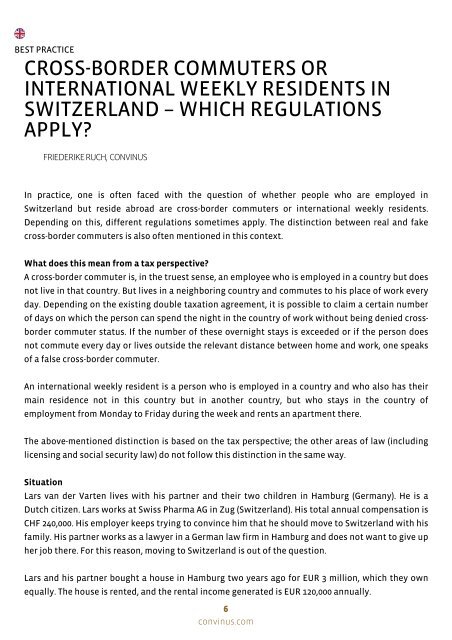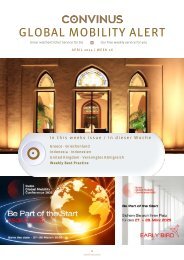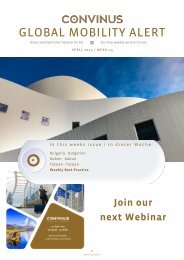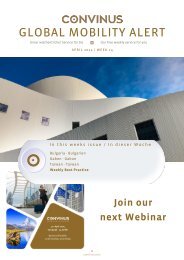CONVINUS Global Mobility Alert - Week 12.2024
You also want an ePaper? Increase the reach of your titles
YUMPU automatically turns print PDFs into web optimized ePapers that Google loves.
BEST PRACTICE<br />
CROSS-BORDER COMMUTERS OR<br />
INTERNATIONAL WEEKLY RESIDENTS IN<br />
SWITZERLAND – WHICH REGULATIONS<br />
APPLY?<br />
FRIEDERIKE RUCH, <strong>CONVINUS</strong><br />
In practice, one is often faced with the question of whether people who are employed in<br />
Switzerland but reside abroad are cross-border commuters or international weekly residents.<br />
Depending on this, different regulations sometimes apply. The distinction between real and fake<br />
cross-border commuters is also often mentioned in this context.<br />
What does this mean from a tax perspective?<br />
A cross-border commuter is, in the truest sense, an employee who is employed in a country but does<br />
not live in that country. But lives in a neighboring country and commutes to his place of work every<br />
day. Depending on the existing double taxation agreement, it is possible to claim a certain number<br />
of days on which the person can spend the night in the country of work without being denied crossborder<br />
commuter status. If the number of these overnight stays is exceeded or if the person does<br />
not commute every day or lives outside the relevant distance between home and work, one speaks<br />
of a false cross-border commuter.<br />
An international weekly resident is a person who is employed in a country and who also has their<br />
main residence not in this country but in another country, but who stays in the country of<br />
employment from Monday to Friday during the week and rents an apartment there.<br />
The above-mentioned distinction is based on the tax perspective; the other areas of law (including<br />
licensing and social security law) do not follow this distinction in the same way.<br />
Situation<br />
Lars van der Varten lives with his partner and their two children in Hamburg (Germany). He is a<br />
Dutch citizen. Lars works at Swiss Pharma AG in Zug (Switzerland). His total annual compensation is<br />
CHF 240,000. His employer keeps trying to convince him that he should move to Switzerland with his<br />
family. His partner works as a lawyer in a German law firm in Hamburg and does not want to give up<br />
her job there. For this reason, moving to Switzerland is out of the question.<br />
Lars and his partner bought a house in Hamburg two years ago for EUR 3 million, which they own<br />
equally. The house is rented, and the rental income generated is EUR 120,000 annually.<br />
6<br />
convinus.com


















